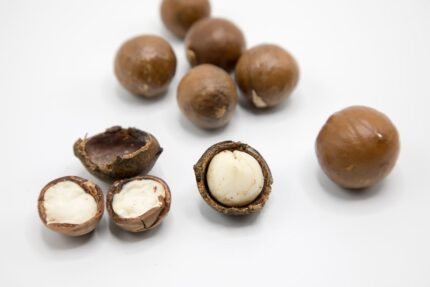Medically reviewed by Dr. Ramesh Gaddam, M.D. — Written by Sumalatha, D.N.H.E
Table of Contents
ToggleMacadamia nuts offer numerous health benefits, making them a nutritious addition to any diet. Rich in monounsaturated fats, they promote heart health by lowering bad cholesterol levels.
Their high fiber content aids digestion and supports gut health.
Macadamias are also a good source of essential vitamins and minerals, including vitamin E, magnesium, and manganese, which contribute to overall wellness.
Additionally, their antioxidants help combat oxidative stress, potentially reducing the risk of chronic diseases.

1. Nutrition
Nutritional profile of macadamia nuts per 100 grams
| Nutrient | Amount |
|---|---|
| Calories | 718 kcal |
| Protein | 7.91 g |
| Total Fat | 75.77 g |
| – Saturated Fat | 12.06 g |
| – Monounsaturated Fat | 58.88 g |
| – Polyunsaturated Fat | 1.50 g |
| Carbohydrates | 13.82 g |
| – Dietary Fiber | 8.6 g |
| – Sugars | 4.57 g |
| Vitamin E | 0.54 mg |
| Thiamine (Vitamin B1) | 1.195 mg |
| Riboflavin (Vitamin B2) | 0.162 mg |
| Niacin (Vitamin B3) | 2.473 mg |
| Folate (Vitamin B9) | 11 µg |
| Magnesium | 130 mg |
| Phosphorus | 188 mg |
| Potassium | 368 mg |
| Calcium | 85 mg |
| Iron | 3.69 mg |
| Zinc | 1.30 mg |
| Manganese | 4.131 mg |
| Selenium | 3.6 µg |
2. Health Benefits
Macadamia nuts provide a wealth of health benefits due to their rich nutritional profile:
Promotes Heart Health:
High in monounsaturated fats, macadamias help reduce bad cholesterol levels (LDL) and increase good cholesterol levels (HDL), promoting cardiovascular health and reducing the risk of heart disease.
Contains Antioxidant Properties:
They contain antioxidants like vitamin E and flavonoids, which combat oxidative stress, reducing inflammation and the risk of chronic diseases, including cancer.
Helps in Weight Management:
Despite their high-calorie content, the healthy fats and fiber in macadamia nuts can promote satiety, helping to control appetite and support weight management when consumed in moderation.
Supports Digestive Health:
The fiber in macadamia nuts supports a healthy digestive system by promoting regular bowel movements and feeding beneficial gut bacteria.
Helps in Bone Health:
Rich in essential minerals like calcium, phosphorus, and magnesium, macadamias support strong bones and teeth, and the manganese content helps in bone formation.
May Aid in Brain Health:
The healthy fats and antioxidants in macadamias contribute to brain health by supporting cognitive function and protecting against neurodegenerative diseases.
Maintains Skin Health:
Vitamin E and other antioxidants in macadamia nuts help maintain healthy skin by protecting it from oxidative damage and promoting skin repair and rejuvenation.
Controls Blood Sugar :
The combination of healthy fats, fiber, and low glycemic index makes macadamia nuts a good choice for managing blood sugar levels, which is beneficial for people with diabetes or those at risk.
Incorporating macadamia nuts into a balanced diet can enhance overall health and well-being, making them a nutritious and delicious addition to meals and snacks.
3. Uses

Macadamia nuts are versatile and can be used in various culinary and non-culinary applications:
Culinary Uses
Baking:
Macadamia nuts are popular in baked goods like cookies, cakes, muffins, and breads, adding a rich, buttery flavor and crunchy texture.
Snacking:
They can be enjoyed raw, roasted, salted, or flavored as a healthy and satisfying snack.
Salads:
Chopped or whole macadamia nuts make a great addition to salads, providing a crunchy texture and a boost of nutrients.
Cooking:
They can be incorporated into savory dishes such as stir-fries, meat coatings, and vegetable sautés.
Nut Butters:
Macadamia nuts can be ground into a smooth, creamy butter, which is a delicious spread for toast, fruits, or used as an ingredient in recipes.
Dairy Alternatives:
Macadamia milk is a plant-based milk alternative made from macadamia nuts, used in coffee, smoothies, and cereals.
Desserts:
They are a popular ingredient in desserts like ice cream, chocolate, and brittle.
Oil:
Macadamia nut oil is used in cooking and salad dressings due to its high smoke point and rich flavor.
Non-Culinary Uses
Cosmetics:
Macadamia oil is used in skincare products for its moisturizing and anti-aging properties. It is found in lotions, creams, and hair care products.
Massage Oils:
The oil is also used in massage therapy due to its smooth texture and skin-nourishing benefits.
Nutritional Supplements:
Macadamia nuts are sometimes processed into supplements for their health benefits.
Animal Feed:
By-products from macadamia nut processing are sometimes used as animal feed.
Innovative Uses
Eco-Friendly Products:
The shells of macadamia nuts are being explored for use in creating biodegradable plastic alternatives and as a source of biomass for energy production.
Horticulture:
Macadamia shells are used as mulch in gardens and landscaping to help retain soil moisture and suppress weeds.
Macadamia nuts’ versatility in both culinary and non-culinary applications makes them a valuable and multipurpose product.
4. Side Effects

While macadamia nuts offer numerous health benefits, there are some potential side effects and considerations to be aware of:
Allergic Reactions:
Some individuals may be allergic to macadamia nuts, experiencing symptoms such as itching, swelling, hives, abdominal pain, and in severe cases, anaphylaxis.
People with nut allergies should avoid macadamia nuts.
High-Calorie Content:
Macadamia nuts are calorie-dense, with about 718 calories per 100 grams.
Consuming them in large quantities can contribute to weight gain if not accounted for within the overall daily caloric intake.
Digestive Issues:
Due to their high-fat content, excessive consumption of macadamia nuts can lead to digestive problems like diarrhea, bloating, and stomach cramps in some individuals.
Possible Interactions:
There are no known significant interactions with medications.
But, it’s always advisable to consult with a healthcare provider if you have concerns about consuming macadamia nuts alongside specific medications or health conditions.
Choking Hazard:
Whole macadamia nuts can pose a choking risk, especially for young children and the elderly.
It is important to ensure they are chewed properly or to offer them in chopped or ground form to these groups.
Toxicosis in Pets:
Macadamia nuts are toxic to dogs and can cause symptoms like weakness, vomiting, tremors, and hyperthermia.
Pet owners should keep macadamia nuts out of reach of their pets.
In general, moderation and awareness of personal health conditions are key to safely enjoying macadamia nuts.
5. How to Eat Macadamia Nuts
Macadamia nuts can be enjoyed in various ways, both raw and incorporated into a wide range of dishes. Here are some popular methods for eating macadamia nuts:
Raw or Roasted
- Raw: Enjoy them straight from the bag as a healthy snack.
- Roasted: Roast them in the oven at 350°F (175°C) for 10-15 minutes until golden brown. They can be roasted plain or with a light coating of oil and seasoning.
Baked Goods
- Cookies: Add chopped macadamia nuts to cookie dough for added crunch and flavor.
- Cakes and Muffins: Incorporate them into the batter of cakes and muffins for a rich, buttery taste.
- Breads: Mix them into bread dough or sprinkle on top before baking for extra texture.
Cooking and Salads
- Salads: Toss whole or chopped macadamia nuts into green salads or grain salads for added protein and crunch.
- Stir-Fries: Add them to vegetable or meat stir-fries for a nutty flavor and extra texture.
- Coatings: Use crushed macadamia nuts as a coating for chicken, fish, or tofu before baking or frying.
Nut Butters and Spreads
- Nut Butter: Blend macadamia nuts in a food processor until smooth to make macadamia nut butter, which can be used as a spread or in recipes.
- Dips and Sauces: Incorporate macadamia nut butter into dips and sauces for a creamy, nutty flavor.
Desserts
- Ice Cream: Add chopped macadamia nuts to ice cream or frozen yogurt.
- Chocolate: Combine them with melted chocolate to make macadamia nut clusters or bark.
- Pies and Tarts: Use them in pie crusts or as a topping for tarts and cheesecakes.
Plant-Based Milk
- Macadamia Milk: Blend soaked macadamia nuts with water and strain to make macadamia milk, which can be used in coffee, smoothies, or cereals.
Oils and Condiments
- Macadamia Oil: Use macadamia nut oil for cooking or as a salad dressing. It has a high smoke point and a mild, buttery flavor.
Snacking
- Seasoned Nuts: Toss them with spices, herbs, or a bit of honey and roast for a flavorful snack.
- Trail Mix: Combine macadamia nuts with dried fruits, seeds, and other nuts to make a nutritious trail mix.
By incorporating macadamia nuts into various dishes, you can enjoy their rich flavor and nutritional benefits in multiple ways.
6. What do Macadamia Nuts taste like?
Macadamia nuts are known for their distinctive taste and texture:
Flavor Profile
Macadamia nuts have a rich, buttery flavor that is smooth and creamy, making them a luxurious treat.
They possess a subtle sweetness that complements both sweet and savory dishes.
While not as intensely nutty as some other nuts, they still offer a pleasant, mild nutty taste.
Texture
When fresh or lightly roasted, macadamia nuts have a firm, crisp texture that provides a satisfying crunch.
Their high oil content gives them a creamy texture that melts in the mouth when chewed, enhancing their rich flavor.
Overall, macadamia nuts are prized for their luxurious taste and texture, making them a favorite in gourmet cooking and baking.
7. How long do Macadamia Nuts Last?
The shelf life of macadamia nuts can vary based on storage conditions and whether they are shelled or unshelled. Here are some general guidelines:
Unshelled Macadamia Nuts
- Room Temperature: Up to 3 months
- Refrigerated: Up to 6 months
- Frozen: Up to 1 year or more
Shelled Macadamia Nuts
- Room Temperature: Up to 1 month
- Refrigerated: Up to 3-6 months
- Frozen: Up to 1 year or more
Storage Tips
Store macadamia nuts in airtight containers to protect them from moisture and air, which can cause them to go rancid.
Keep them in a cool, dark place away from direct sunlight and heat sources.
Refrigeratemacadamia nuts to extend their shelf life, especially in warmer climates.
For long-term storage, freezingis the best option. Ensure they are in airtight, freezer-safe containers or bags.
By following these storage guidelines, you can maximize the shelf life of your macadamia nuts and enjoy their fresh, rich flavor for a longer period.
8. Benefits for Skin

Macadamia nuts offer several benefits for skin health due to their nutrient-rich composition:
Moisturizing:
The high content of monounsaturated fatty acids, particularly oleic acid, helps replenish the skin’s lipid barrier, preventing moisture loss and keeping the skin hydrated.
Antioxidant Protection:
Macadamia nuts contain vitamin E, a potent antioxidant that helps neutralize free radicals and protect skin cells from oxidative stress, which can contribute to premature aging.
Anti-Inflammatory Properties:
The fatty acids and antioxidants in macadamia nuts have anti-inflammatory properties, soothing irritated skin and reducing redness or inflammation.
Softens and Smoothens:
Regular use of macadamia nut oil or products containing macadamia oil can help soften and smooth the skin, improving its texture and overall appearance.
Wound Healing:
The presence of palmitoleic acid, a component of macadamia nut oil, may aid in wound healing by promoting skin regeneration and reducing healing time.
Nutrient Absorption:
The oil from macadamia nuts can enhance the absorption of nutrients into the skin, making it a beneficial ingredient in skincare formulations.
Anti-Aging Benefits:
By maintaining hydration, protecting against free radicals, and supporting skin elasticity, macadamia nuts can help diminish the appearance of fine lines and wrinkles.
Summary:
To incorporate macadamia nuts into your skincare routine, consider using macadamia nut oil directly on the skin.
Look for skincare products that contain macadamia oil, or consume them regularly as part of a balanced diet to support overall skin health from within.
9. Benefits for Hair

Macadamia nuts offer several benefits for hair health, primarily due to their nutrient-rich composition and moisturizing properties:
Moisture and Shine:
Macadamia nut oil is rich in monounsaturated fatty acids, such as oleic acid, which closely resembles the sebum naturally produced by the scalp.
This makes it an excellent moisturizer that can penetrate the hair follicles, hydrating and smoothing the hair shaft. This results in increased shine and reduced frizz.
Nutrient Absorption:
The oil from macadamia nuts helps the scalp and hair absorb essential nutrients more effectively, promoting overall hair health and growth.
Strength and Elasticity:
The proteins and vitamins in macadamia nuts, such as vitamin E, selenium, and zinc, contribute to strengthening hair strands and improving elasticity.
This can reduce breakage and split ends, promoting healthier-looking hair.
Scalp Health:
Macadamia nut oil has anti-inflammatory properties that can soothe and moisturize the scalp, reducing dryness, itchiness, and irritation. A healthy scalp environment is crucial for promoting hair growth.
Protection:
The antioxidants in macadamia nuts, including vitamin E, help protect hair from environmental stressors, UV damage, and oxidative damage caused by free radicals.
Repair and Regeneration:
The fatty acids in macadamia nut oil, particularly palmitoleic acid, may help repair damaged hair and promote hair regeneration by nourishing the follicles and stimulating circulation in the scalp.
10. How to Use Macadamia Nuts for Hair:
Hair Masks:
Create a nourishing hair mask by mixing macadamia nut oil with other beneficial ingredients like honey, avocado, or yogurt.
Apply to damp hair, leave on for 20-30 minutes, then rinse thoroughly.
Leave-In Conditioner:
Use macadamia nut oil as a leave-in conditioner by applying a small amount to the ends of damp or dry hair to moisturize and tame frizz.
Shampoo and Conditioner:
Look for hair care products that contain macadamia nut oil or extract to reap the benefits of its moisturizing and nourishing properties.
Dietary Incorporation:
Consuming macadamia nuts as part of a balanced diet can also support hair health from within, providing essential nutrients that promote strong, shiny hair.
10. Benefits for Men

Macadamia nuts offer several health benefits for men, primarily due to their nutrient-rich composition and unique properties:
Heart Health:
The high content of monounsaturated fats in macadamia nuts helps promote cardiovascular health by lowering bad cholesterol (LDL) levels and increasing good cholesterol (HDL) levels.
This can reduce the risk of heart disease and stroke.
Prostate Health:
Macadamia nuts contain selenium, a mineral that is important for prostate health.
Selenium has antioxidant properties that may help protect the prostate gland from oxidative stress and inflammation.
Energy and Stamina:
The healthy fats, protein, and micronutrients in macadamia nuts provide sustained energy levels and support muscle function, making them a beneficial snack for active men.
Bone Health:
Macadamia nuts are a good source of calcium, magnesium, and phosphorus, which are essential minerals for maintaining strong bones and preventing osteoporosis.
Anti-Inflammatory Properties:
The fatty acids and antioxidants in macadamia nuts have anti-inflammatory properties, which may help reduce inflammation in joints and muscles, supporting overall mobility and joint health.
Skin and Hair Health:
The moisturizing properties of macadamia nut oil can benefit skin and hair health, promoting hydration, reducing dryness, and enhancing appearance.
Weight Management:
Despite being calorie-dense, macadamia nuts can be part of a balanced diet for weight management due to their satiating effect and nutrient density.
Mental Well-being:
The nutrients in macadamia nuts, such as vitamin E and omega-9 fatty acids, may support cognitive function and mood stability, contributing to overall mental well-being.
11. Benefits for Women

Macadamia nuts offer several health benefits specifically beneficial for women, owing to their nutrient profile and therapeutic properties:
Heart Health:
Rich in monounsaturated fats and low in unhealthy saturated fats, macadamia nuts can help lower bad cholesterol (LDL) levels and increase good cholesterol (HDL) levels.
This reduces the risk of heart disease, which is a significant concern for women.
Bone Health:
Macadamia nuts are a good source of calcium, magnesium, and phosphorus, essential minerals that support bone density and strength.
This is particularly important for women, who are at higher risk of osteoporosis.
Menopause Support:
The healthy fats in macadamia nuts can help alleviate symptoms of menopause, such as hot flashes and mood swings.
The vitamin E content also supports overall hormonal balance.
Skin and Hair Health:
The moisturizing properties of macadamia nut oil can benefit skin and hair health, promoting hydration, reducing dryness, and improving overall appearance.
Antioxidant Protection:
Macadamia nuts contain vitamin E, selenium, and other antioxidants that help protect cells from oxidative damage.
This can slow down the aging process and reduce the risk of chronic diseases.
Mental Well-being:
The nutrients in macadamia nuts, such as vitamin E and omega-9 fatty acids, support cognitive function and mood stability, contributing to overall mental well-being.
Weight Management:
Despite their calorie density, macadamia nuts can be part of a balanced diet for weight management due to their satiating effect and nutrient density.
Frequently Asked Questions (FAQs)
People searched for questions frequently about Macadamia Nuts are:
How many macadamia nuts should you eat a day?
There is no strict recommendation, but a serving size of macadamia nuts is typically around 10-12 nuts (approximately 28 grams or 1 ounce).
Moderation is key due to their high calorie and fat content.
What are macadamia nuts good for?
Macadamia nuts are good for heart health, bone health, skin and hair health, providing antioxidant protection, supporting mental well-being, and potentially aiding in weight management.
Are macadamia nuts healthier than almonds?
Both nuts offer health benefits. Macadamia nuts are higher in monounsaturated fats and lower in omega-6 fatty acids compared to almonds, which may offer different cardiovascular benefits.
Are macadamia nuts a superfood?
Yes, macadamia nuts are often considered a superfood due to their nutrient density, healthy fat profile, and various health benefits.
What are the top 5 healthiest nuts?
The top 5 healthiest nuts include almonds, walnuts, pistachios, pecans, and Brazil nuts, each offering unique nutritional benefits such as heart-healthy fats, antioxidants, and minerals.
Who should not eat macadamia nuts?
Individuals allergic to tree nuts should avoid macadamia nuts.
Additionally, those watching their calorie intake should consume them in moderation due to their high calorie content.
Why are macadamia nuts so expensive?
Macadamia nuts are expensive due to their labor-intensive harvesting process, low yield per tree, and their popularity as a gourmet nut.
They also require specific growing conditions.
Do macadamia nuts have omega-3?
Macadamia nuts contain a small amount of omega-3 fatty acids, but they are primarily rich in monounsaturated fats, particularly oleic acid.
Are macadamia nuts good for skin?
Yes, macadamia nuts are good for skin due to their moisturizing properties, antioxidant content, and ability to support skin hydration and elasticity.
Which nut makes skin glow?
Nuts like almonds, walnuts, and macadamia nuts are known for promoting glowing skin due to their nutrient profiles that support skin health.
Does macadamia lighten skin?
There is no scientific evidence to suggest that macadamia nuts lighten skin. Their benefits for skin primarily involve hydration and moisturization.
Why is macadamia good for hair?
Macadamia nuts are good for hair due to their high content of monounsaturated fats and vitamin E, which moisturize the scalp, strengthen hair strands, and promote hair growth.
Which nut is best for hair fall?
Nuts rich in biotin, vitamin E, and essential fatty acids like almonds, walnuts, and Brazil nuts are beneficial for reducing hair fall and promoting hair health.
What is macadamia nut best for?
Macadamia nuts are best known for their heart-healthy fats, antioxidant properties, skin and hair benefits, and potential support for bone health and mental well-being.
Is macadamia good or bad?
Macadamia nuts are generally considered good due to their nutrient density and health benefits, but they are high in calories and fats, so moderation is advised.
Can I eat macadamia every day?
Yes, you can eat macadamia nuts daily in moderation as part of a balanced diet, but be mindful of their calorie content.
How to eat macadamia nut?
Macadamia nuts can be eaten raw, roasted, salted, or unsalted. They can also be added to salads, baked goods, or used to make nut butter.
Can we eat raw macadamia nuts?
Yes, raw macadamia nuts are safe to eat and can be enjoyed as a nutritious snack or added to various dishes.
Can I eat macadamia at night?
Eating macadamia nuts at night is fine, as they provide healthy fats and protein that can help satisfy hunger and promote satiety.
Are macadamia nuts expensive?
Yes, macadamia nuts are generally expensive compared to other nuts due to their cultivation process, low yield per tree, and demand in gourmet markets.
Do macadamia nuts cause gas?
Macadamia nuts are not typically associated with causing gas, but like any high-fat food, consuming them excessively may lead to digestive discomfort in some individuals.
Also Read
Medically reviewed by Dr. Ramesh Gaddam, M.D.

General Physician, Diabetologist, and Critical Care Specialist.
Related
Discover more from Health Build-Up
Subscribe to get the latest posts sent to your email.

1 thought on “11 Benefits of Macadamia Nuts (Skin, Hair, Men, Women)”
Comments are closed.